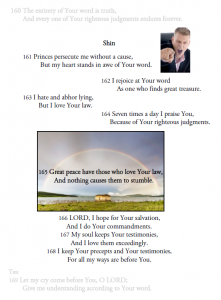 There are no imperatives in the Shin section, no requests or demands of God. Situated as it is between two sections that are loaded with imperatives, Shin is something of the eye in the middle of the storm.
There are no imperatives in the Shin section, no requests or demands of God. Situated as it is between two sections that are loaded with imperatives, Shin is something of the eye in the middle of the storm.
The first few verses here alternate between positive and negative emotions, but the positive quickly prevails and continues to the end of the section.
The first verse begins with another mention of the psalmist’s persecutors, but they are quickly left behind and do not return–this section will not be about persecution but about peace. Besides, we do not need the persecutors to be present in order to see their defeat.
That they are defeated is seen as soon as the following verse: “I rejoice at Your word, As one who finds great treasure.” Most English translations correctly use the word “spoil” instead of “treasure” here. Though his enemies are hard upon him, the psalmist is already enjoying the spoils of victory. The psalmist has not just discovered that love of God’s word leads to eventual victory over the enemy–the deeper truth here is that the love of God’s word is victory over the enemy. What is the goal of our great enemy, after all, if not to get our eyes off God? Delighting in God word, then, regardless of our circumstances, is continual victory.
If Shin is the eye of the storm, vs. 165 is the eye of the eye. Set in the middle of the section, it is distinguished by being the only verse in the section that does not refer directly to the psalmist (though his inclusion in the group of those who love God’s law is clearly implied). As we approach the end of this psalm about God’s word, it’s fitting that the psalmist speaks of peace, one of the word’s greatest
benefits.
A. F. Kirkpatrick comments that those who love God’s law “are not ‘scandalized,’ made to stumble and driven into scepticism by the sight of the anomalies of the world, such as suffering goodness and triumphant wickedness” (The Book of Psalms). It turns out the best way to prevent stumbling into sin or unbelief is not by watching our feet or our footing; we don’t obtain peace or remain faithful by focusing on our problems or our enemies. Rather, peace and obedience come from training our eyes on God and his word. Keep your eyes on God! Then the feet will take care of themselves, and God will take care of our enemies.
This is the psalmist’s intent, and his practice. “I love and obey Your law; this is what I do, and what I will always do,” he proclaims. He has said as much throughout the psalm, but only in these eight verses of Shin does he keep up the theme from start to finish. This is “not the boasting of the Pharisee,” says Kirkpatrick, “but the honest profession of a good conscience.”
“I keep Your precepts and Your testimonies, For all my ways are before You,” declares the psalmist in vs. 168. Perhaps he is citing God’s perfect knowledge as a motive for his obedience (i.e., “I obey, because I know I cannot hide from you.” See Heb. 4:13). More likely, though, he is appealing to God’s omniscience as his witness: “I dare to declare my faithfulness because I know that you see everything, so you know it’s true.” This is, as Kirkpatrick says, is the “courage of a good conscience”–and with such courage we defeat our enemies without giving them a second thought.
Image courtesy of imagerymajestic / FreeDigitalPhotos.net
